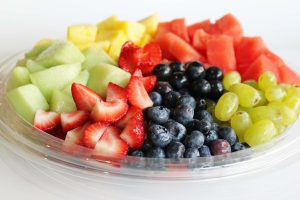Diet for a swollen belly?
One of the low glycemic and lower carbohydrate diets (low carb diet) is the low fructose diet , also known as the Fodmap diet , which has long been studied in Australia (see Monash University). What Fodmaps are I have already written here : they are a series of foods including some types of cereals, legumes, nuts and fruit, which due to their sugary molecular structure creates intestinal fermentation . Foods that should be excluded from the diet or significantly limited if we already have problems with bloating and digestion.
In fact, people with digestive problems achieve greater results by removing or limiting (even avoiding associating them together) the Fodmap foods from the diet. Obviously it is not possible to completely eliminate these foods from the diet , because it would mean depriving oneself of many cereals and most of the legumes and fruit, for example. Research has shown that Fodmaps foods have high amounts of fructose, and that it would be enough to simply limit these foods or not combine them to improve both metabolic syndrome and diabetes.
According to one study, women who eat smaller amounts of fructose foods lose weight very easily , and have better digestion and stable blood sugar levels. So what are the least fructose-rich carbohydrates?
And since there are so many FODMAP foods, how do you go on a diet that excludes them all?
If we wanted to diet without Fodmap foods, we should in fact avoid all fruit, apart from red fruits and citrus fruits in moderation, all legumes, onion and garlic, all dairy products and cheeses, wheat, barley. and rye, many types of sugars and honey apart from stevia, some types of vegetables, etc.
Protein foods are saved, but not all vegetable protein resources: soy is saved, but not soy milk, for example.
You can eat lactose-free foods and gluten-free cereals, but baked goods derived from wheat (crackers) are allowed.
In short: it is very difficult to understand how much and how to exclude Fodmap foods from your diet.But one thing is clear: high fructose foods should be limited if we already have digestive problems. In particular, legumes and very sugary fruit, pasta and wheat derivatives, milk and dairy products.
But to think that you can put aside all foods that contain fructose seems to me a serious nonsense. The same Australian studies do not speak of a total elimination, but temporary, with the gradual reintegration of these foods and the normal intake in more modest quantities .
The advice that can be given, if you have intestinal disorders, is to eliminate foods that contain fructose and lactose, which create intestinal fermentation, and monitor the results. So eat rice instead of pasta, sour fruit instead of sugary fruit, drink bitter rather than sugar, avoid cheeses and dairy products by replacing them with lactose-free dairy products if we already have a swollen stomach, and see if these changes bring us relief.





























+ There are no comments
Add yours